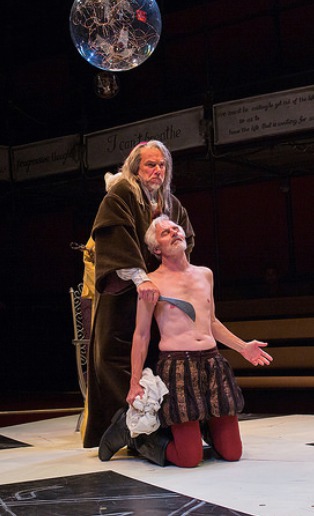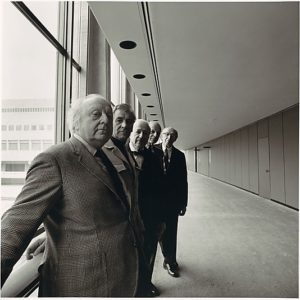 “We turn to literature not only for respite, relaxation or escape from the boredom of reality and the gnaw of suffering, but to get away from uncertainty. And certainty is in the past. There, so it seems to us, things have been settled. There we can see a whole picture. For to see something whole becomes a necessity to people like ourselves whose world has fallen to pieces. Perhaps, we think, the certainty of the past will help our minds to substantiate a faith in the kind of certainty we hope for in the future.”
“We turn to literature not only for respite, relaxation or escape from the boredom of reality and the gnaw of suffering, but to get away from uncertainty. And certainty is in the past. There, so it seems to us, things have been settled. There we can see a whole picture. For to see something whole becomes a necessity to people like ourselves whose world has fallen to pieces. Perhaps, we think, the certainty of the past will help our minds to substantiate a faith in the kind of certainty we hope for in the future.”
V.S. Pritchett, My Good Books (courtesy of Patrick Kurp)

 All that said, “The Merchant of Venice” inevitably poses problems for actors and directors who are reluctant to give ethnic offense, and the success of their productions necessarily depends on the ingenuity with which they contrive to draw the sting. Tina Packer, to her credit, confronts the problem head on in her thrilling new Shakespeare & Company production, upping the ante as high as possible by boldly underlining the apparent anti-Semitism of Shakespeare’s text— every repetition of such ugly phrases as “villain Jew” and “dog Jew” cracks through the air like lightning—while simultaneously placing it in a wider theatrical context. Her Shylock (Jonathan Epstein) is a cultivated, well-spoken gent, a man at first glance more sinned against than sinning, which makes it all the more shocking (not least to the disapproving members of his own temple) when he lets the mask slip and confesses his thirst for blood.
All that said, “The Merchant of Venice” inevitably poses problems for actors and directors who are reluctant to give ethnic offense, and the success of their productions necessarily depends on the ingenuity with which they contrive to draw the sting. Tina Packer, to her credit, confronts the problem head on in her thrilling new Shakespeare & Company production, upping the ante as high as possible by boldly underlining the apparent anti-Semitism of Shakespeare’s text— every repetition of such ugly phrases as “villain Jew” and “dog Jew” cracks through the air like lightning—while simultaneously placing it in a wider theatrical context. Her Shylock (Jonathan Epstein) is a cultivated, well-spoken gent, a man at first glance more sinned against than sinning, which makes it all the more shocking (not least to the disapproving members of his own temple) when he lets the mask slip and confesses his thirst for blood.
 The answer is that they were American classical composers active from the ’40s into the ’70s. Among other things, they wrote symphonies that were critically acclaimed and frequently performed by such famous émigré conductors as Serge Koussevitzky, Eugene Ormandy and Leopold Stokowski. Piston and Schuman won the Pulitzer Prize, and all four men used to be fairly familiar to the general public, almost as much so as Aaron Copland, our most popular mid-century classical composer. Schuman actually appeared in 1962 as the mystery guest on the popular TV game show “What’s My Line?” Much of their best music was recorded, and many of those recordings are still in print. Yet I’d be surprised if more than a handful of people reading this column recognize any of their names, nor is their music heard much nowadays. In a column written last month for the Guardian—a British newspaper, mind you—Alan Fletcher cited the following statistic: “Some quick research shows that Harris, Mennin, Piston, Schuman and Elliott Carter (who together wrote more than 100 concert symphonic works) had, in the past five years, a total of just 20 performances by U.S. orchestras.” Four performances apiece. That’s obscurity.
The answer is that they were American classical composers active from the ’40s into the ’70s. Among other things, they wrote symphonies that were critically acclaimed and frequently performed by such famous émigré conductors as Serge Koussevitzky, Eugene Ormandy and Leopold Stokowski. Piston and Schuman won the Pulitzer Prize, and all four men used to be fairly familiar to the general public, almost as much so as Aaron Copland, our most popular mid-century classical composer. Schuman actually appeared in 1962 as the mystery guest on the popular TV game show “What’s My Line?” Much of their best music was recorded, and many of those recordings are still in print. Yet I’d be surprised if more than a handful of people reading this column recognize any of their names, nor is their music heard much nowadays. In a column written last month for the Guardian—a British newspaper, mind you—Alan Fletcher cited the following statistic: “Some quick research shows that Harris, Mennin, Piston, Schuman and Elliott Carter (who together wrote more than 100 concert symphonic works) had, in the past five years, a total of just 20 performances by U.S. orchestras.” Four performances apiece. That’s obscurity. IN GARRISON, N.Y.:
IN GARRISON, N.Y.: